Categories
Subjects
Authors
Artists
Venues
Locations
Calendar
Filter
Done
June 16, 2021 – Review
13th Shanghai Biennale, “Bodies of Water”
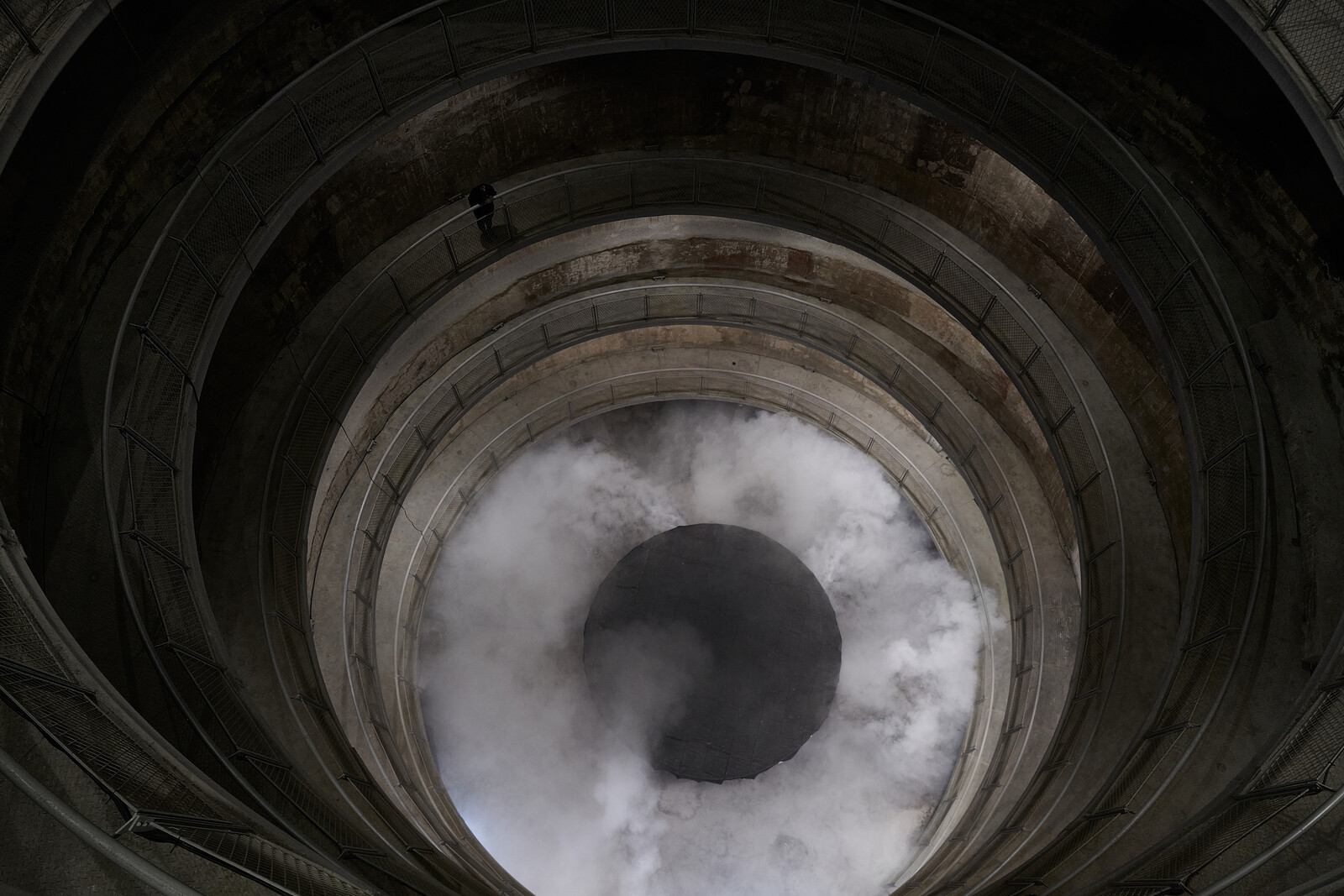
When “Bodies of Water,” the 13th edition of the Shanghai Biennale, opened in November last year, it adopted a fluid approach to programming in response to the pandemic. In place of the traditional biennale format was a multi-platform “in crescendo” project comprising three “phases” and lasting a total of eight months. The first two of these, “A Wet-Run Rehearsal” and “An Ecosystem of Alliance,” featured live events, screenings, and discussions—held within the Power Station of Art (PSA), in art spaces along the Yangtze river, and online—that explored the exhibition’s central concerns: ecology, hydrology, posthumanism, and the interconnectedness of all lifeforms on earth. In the midst of a pandemic precipitated by zoonosis, these are timely concerns.
In April this year “The Exhibition,” the biennale’s third and final phase, opened in the PSA. This massive decommissioned power station, modelled on London’s Tate Modern, was in 2012 repurposed as the first state-run museum of contemporary art on mainland China. Situated on the banks of the Huangpu River, which the electric plant helped to industrialize, it is an apt location for an exhibition that emphasizes the inseparability of humans from the natural world they exploit. Curated by architect, researcher, and writer Andrés Jaque …
December 3, 2018 – Review
12th Shanghai Biennale, “禹步 Proregress: Art in an Age of Historical Ambivalence”
Tianyuan Deng
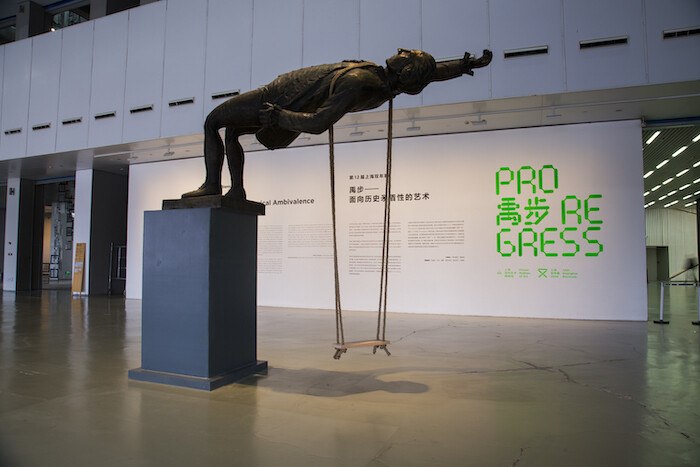
While exhibitions that question the modernist promise of progress are hardly new, a biennale that takes stock of the current state of regress raises high hopes. Historical regression is proceeding on several fronts. One is the collapse of the neoliberal faith in the end-of-history narrative—that liberal democracy and free trade economics triumphed over fascism and communism in 1989—as democracies across the West have embraced isolationist hard-right policies that indicate a return to fascism. Another is the resurgence of geopolitical antagonisms whose Manichaeism echoes the Cold War. Despite this golden opportunity for examination, “Pro-regress: Art in an Age of Historical Ambivalence,” curated by Cuauhtémoc Medina, María Belén Sáez de Ibarra, Yukie Kamiya, and Wang Weiwei, is a largely uninspiring reflection on our times.
The biennale’s ambition, as indicated by its subtitle, is to reckon with “art in the age of historical ambivalence.” But the curators’ statement makes it clear that such ambivalence does not primarily pertain to current disillusionment, but rather to the stuttering back-and-forth movement of modernity in general. The premise thus echoes that of the 2015 Venice Biennale, curated by Okwui Enwezor, which posited global reality as “one of constant realignment, adjustment, recalibration, motility, shape-shifting.” One of the centerpieces at …
November 15, 2016 – Review
11th Shanghai Biennale, “Why Not Ask Again”
Xin Wang
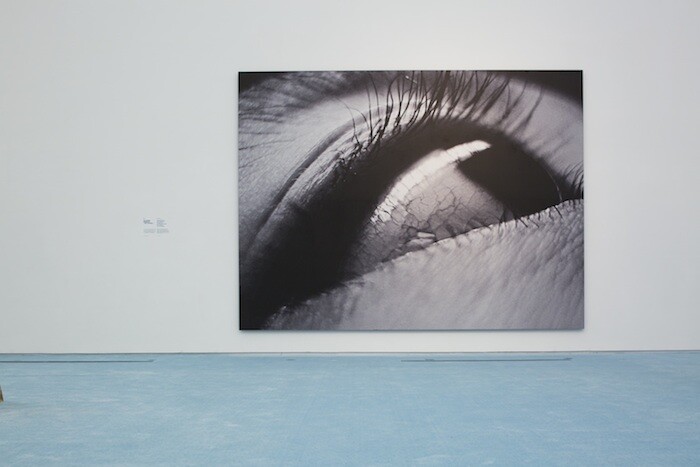
At the 11th Shanghai Biennale, it isn’t possible to take a photograph without capturing people; the vast Power Station of Art—an electric plant turned kunsthalle since 2012—is busy throughout the preview day and public opening. The curators, Raqs Media Collective, have titled this edition of the biennale “Why Not Ask Again: Arguments, Counter-arguments, and Stories,” but the presence of swarming crowds prompts its own questions, the first of which is: who are these biennales for, and what does their audience want from them?
The previous edition, Anselm Franke’s “Social Factory,” was a biennale Shanghai deserved but did not necessarily want. The exhibition illustrated a particular danger in interrogating the social through frameworks structured by the debt of colonial modernity in a country that never had an internalized colonial experience. This isn’t to deny that the long shadow of troubled histories fall over the biennale: curators have always taken that into account, and a reminder for this edition came when, as the exhibition was being installed, a progressive bubble burst with the United States’ election of its next president. In times like this, what power can art hope to harness and generate?
The Delhi-based trio Raqs Media Collective, comprising Jeebesh Bagchi, Monica Narula, …
November 27, 2014 – Review
10th Shanghai Biennale, "Social Factory"
Kevin McGarry
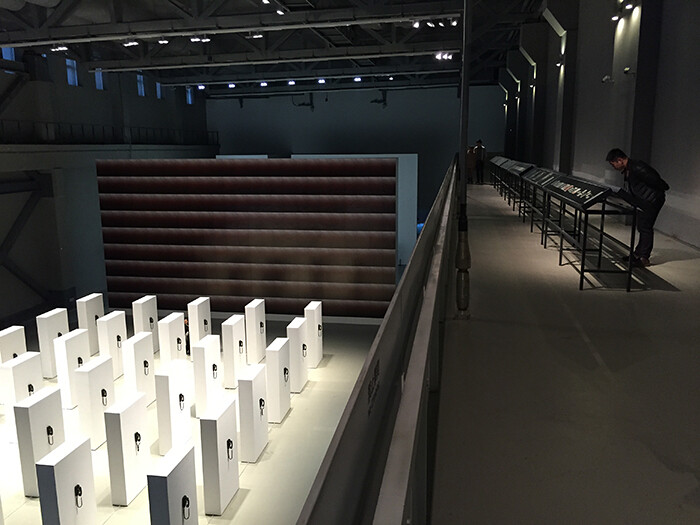
The 10th Shanghai Biennale is sited inside one of Earth’s most colossal art containers, The Power Station of Art, a 42,000-square-meter decommissioned coal power plant used as the Urban Future Pavillion of the 2010 Shanghai Expo, and converted into China’s first and only state-run contemporary art institution in 2012. Entitled “Social Factory” and co-curated by a team composed of Anselm Franke, Freya Chou, Cosmin Costinas, and Liu Xiao, with Hila Peleg and Zhu Ye as curators of the film program and satellite venues respectively, the exhibition is a studied excavation of themes that are acutely felt in these halls and in Shanghai—a city which, as Franke points out in his introductory text in the catalogue, is a quintessential “image of a society-in-the-making”—and around the world, to the extent that the totalizing effects of globalized industrialization are omnipresent.
Of the many textual and historical referents put forward in the exhibition’s framing, the central one is “seek truth from facts,” a maxim that originated 2000 years ago from Ting Dynasty teachings, and which in 1938 was exhumed as a foundation of Maoism. The adage was turned on its head 40 years later, when Deng Xiaoping repurposed it in his call for the reopening …
October 8, 2012 – Review
9th Shanghai Biennale and 8th Taipei Biennial
Carol Yinghua Lu
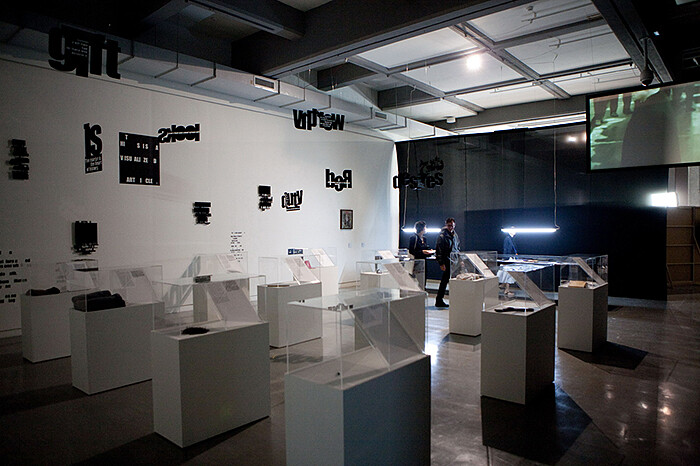
“Modern Monster/Death and Life of Fiction”: Taipei Biennial 2012
September 29, 2012–January 1, 2013
“Reactivation”: The 9th Shanghai Biennale 2012
October 2, 2012–March 31, 2013
Anselm Franke, curator of the Taipei Biennial 2012, once remarked that art is a specialized language that shouldn’t be downplayed for popular appeal. True to his ideals, nearly all the works that filled the three-floor building of the Taipei Fine Arts Museum required a certain degree of intellectual engagement from the viewers, while offering little visual sensation. Nonetheless, it was a mesmerizing experience going through the entire exhibition, which contained so many vitrines and archival displays that it could have easily been mistaken for an ethnographical exhibition. Indeed, the exhibition was an in-depth study of a broad spectrum of human histories, both factual and fictional ones.
Citing Taiwanese art historian David Der-wei Wang’s book The Monster That Is History, in which history itself is compared to the ancient Chinese monster Taowu, Franke sought ways to give form to this indefinable being. He proposed that Taowu is “a possible common experience of all modernity.”
Hence, in the works of the 40-plus artists in the biennial, history is narrated, described, imagined, re-examined, recontextualized, recreated, and rewritten—the hybridity of this monster knows no bounds. …
